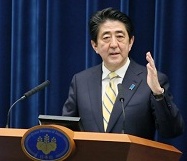Japan’s Abe pushes $29 bn fresh stimulus to spur growth
27 Dec 2014
Japanese Prime Minister Shinzo Abe's new cabinet today approved a 3.5 trillion yen ($29 billion) fresh stimulus package, including subsidies and measures to create new jobs, to spur growth and help pull the world's third-largest economy out of recession.
 The Abe package includes 420 billion yen ($3.5 billion) earmarked for helping stagnant regional economies and households with subsidies, merchandise vouchers and other steps.
The Abe package includes 420 billion yen ($3.5 billion) earmarked for helping stagnant regional economies and households with subsidies, merchandise vouchers and other steps.
Of the total, 1.8 trillion yen will be spent on distributing coupons to buy merchandise, providing fuel subsidies for low-income households, supporting funding of small firms and reviving regional economies.
The remaining 1.7 trillion yen will be used for disaster prevention and rebuilding disaster-hit areas, including those affected by the March 2011 tsunami.
The government will also make efforts to revive the housing market by lowering the mortgage rates offered by a governmental home-loan agency.
Abe who sought fresh mandate after a sales tax hike in April put Japan back in recession, faces strong pressure to do something to restore growth, although analysts are sceptical about how much the new package can spur growth.
The package was unveiled, two weeks after a massive election victory that gave Shinzo Abe's ruling coalition a third chance to push through his Abenomics stimulus policies.
The government said it expects the stimulus plan to boost Japan's GDP by 0.7 per cent.
Meanwhile, official data released on Friday showed inflation eased slightly in November as household spending dropped, hindering the government's effort to get the economy out of recession and back to sustainable growth.
Japan's central bank is buying up to 80 trillion yen ($660 billion) in assets each month, mostly government bonds, to help spur inflation, but so far has not attained its target of 2 per cent price increases overall.


















